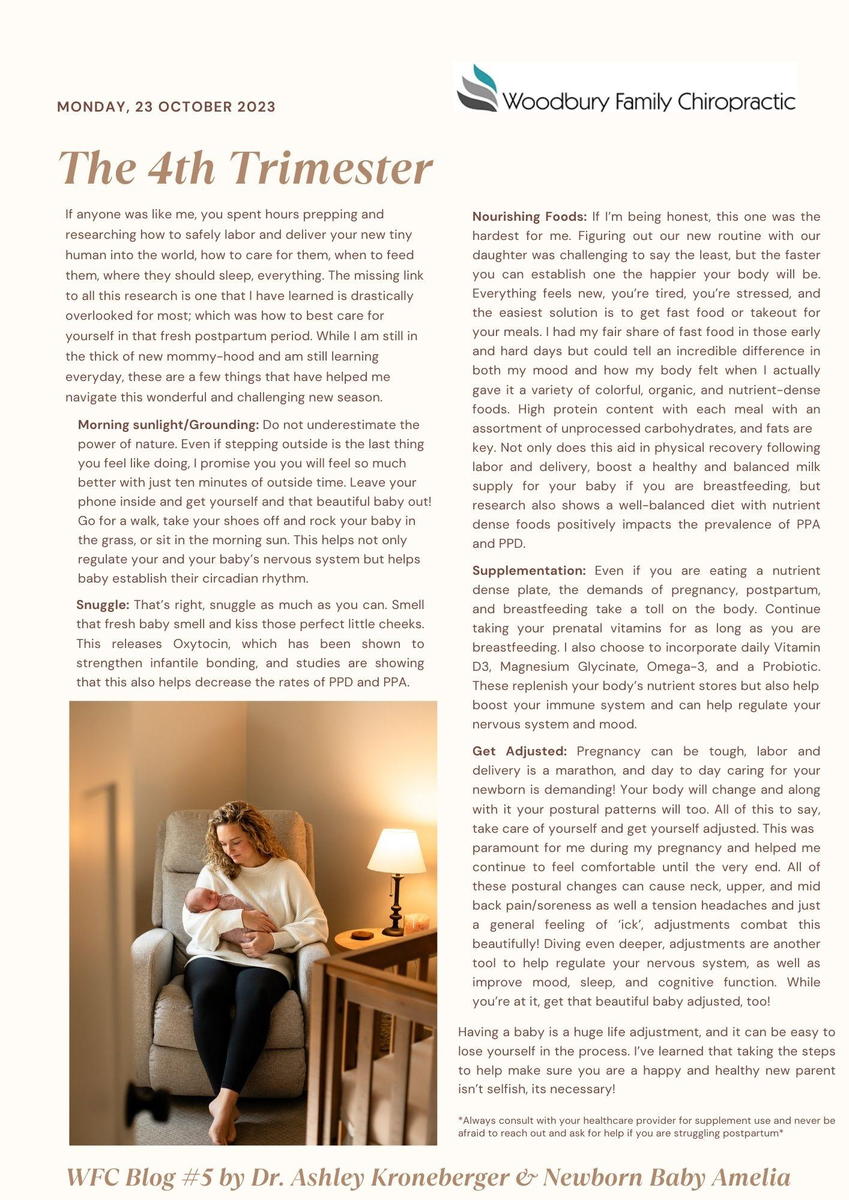WFC Blog #5 The 4th Trimester

- posted: Oct. 23, 2023

The 4th Trimester
If anyone was like me, you spent hours prepping and researching how to safely labor and deliver your new tiny human into the world, how to care for them, when to feed them, where they should sleep, everything. The missing link to all this research is one that I have learned is drastically overlooked for most; which was how to best care for yourself in that fresh postpartum period. While I am still in the thick of new mommy-hood and am still learning everyday, these are a few things that have helped me navigate this wonderful and challenging new season.
Morning sunlight/Grounding: Do not underestimate the power of nature. Even if stepping outside is the last thing you feel like doing, I promise you you will feel so much better with just ten minutes of outside time. Leave your phone inside and get yourself and that beautiful baby out! Go for a walk, take your shoes off and rock your baby in the grass, or sit in the morning sun. This helps not only regulate your and your baby’s nervous system but helps baby establish their circadian rhythm.
Nourishing Foods: If I’m being honest, this one was the hardest for me. Figuring out our new routine with our daughter was challenging to say the least, but the faster you can establish one the happier your body will be. Everything feels new, you’re tired, you’re stressed, and the easiest solution is to get fast food or takeout for your meals. I had my fair share of fast food in those early and hard days but could tell an incredible difference in both my mood and how my body felt when I actually gave it a variety of colorful, organic, and nutrient-dense foods. High protein content with each meal with an assortment of unprocessed carbohydrates, and fats are key. Not only does this aid in physical recovery following labor and delivery, boost a healthy and balanced milk supply for your baby if you are breastfeeding, but research also shows a well-balanced diet with nutrient dense foods positively impacts the prevalence of PPA and PPD.
Supplementation: Even if you are eating a nutrient dense plate, the demands of pregnancy, postpartum, and breastfeeding take a toll on the body. Continue taking your prenatal vitamins for as long as you are breastfeeding. I also choose to incorporate daily Vitamin D3, Magnesium Glycinate, Omega-3, and a Probiotic. These replenish your body’s nutrient stores but also help boost your immune system and can help regulate your nervous system and mood.
Snuggle: That’s right, snuggle as much as you can. Smell that fresh baby smell and kiss those perfect little cheeks. This releases Oxytocin, which has been shown to strengthen infantile bonding, and studies are showing that this also helps decrease the rates of PPD and PPA.
Get Adjusted: Pregnancy can be tough, labor and delivery is a marathon, and day to day caring for your newborn is demanding! Your body will change and along with it your postural patterns will too. All of this to say, take care of yourself and get yourself adjusted. This was paramount for me during my pregnancy and helped me continue to feel comfortable until the very end. All of these postural changes can cause neck, upper, and mid back pain/soreness as well a tension headaches and just a general feeling of ‘ick’, adjustments combat this beautifully! Diving even deeper, adjustments are another tool to help regulate your nervous system, as well as improve mood, sleep, and cognitive function. While you’re at it, get that beautiful baby adjusted, too!
Our Location
Find us on the map
Woodbury Family Chiropractic
2110 Eagle Creek Lane, 400
Woodbury, MN 55129, US

